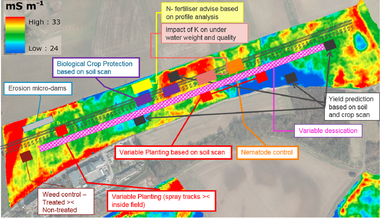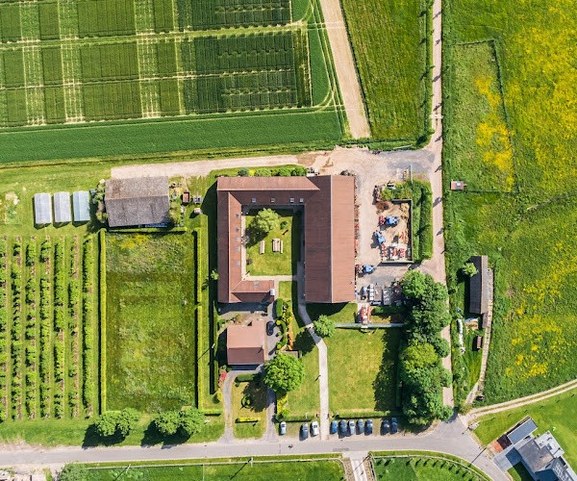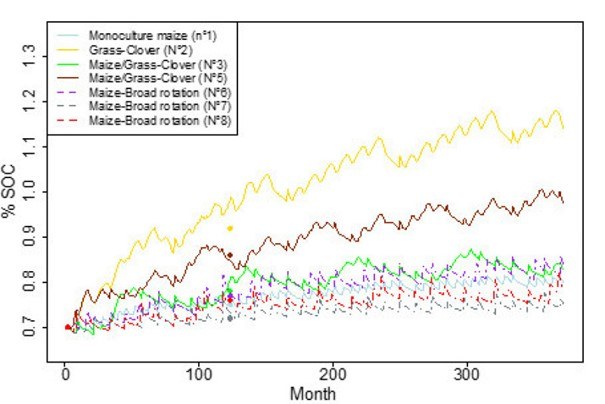Parcel-based agriculture delivers the greatest sustainability gains
(18-01-2022) Long-term field trials carried out by Ghent University and HOGENT in the experimental farm Bottelare show that the greatest gains in terms of sustainability can be achieved with "parcel-based agriculture".
For 10 years, a series of tillage methods and crop rotation systems have been followed up at the experimental farm Bottelare that correspond to different field situations. The objective of these trials was to identify the most sustainable methods in the medium term on the basis of sustainability indicators. These include, for example, soil fertility, the resistance of crops to environmental stress (such as extreme drought or rainfall), yield and any cost savings that certain techniques entail.
The trial looked at monoculture, crop rotation with different crops or green cover crops, tillage methods (plowing versus not plowing) and varying fertilization levels.
"The most sustainable farming method is the one that takes into account all parcel-related factors. These include soil-climatic conditions, crop-specific cultivation requirements and a tailored input of fertilizers and crop protection products," summarizes Professor Geert Haesaert of the Faculty of Bioscience Engineering.
“The highest profits are achieved when the variation within the plot is recorded and the management is adjusted accordingly, as in smart farming.” - Professor Geert Haesaert - Faculty of Bioscience Engineering UGent
No 'one size fits all'
"Sustainability measures cannot be generalised," says Haesaert. "For example, we found that no tillage in a moderately humid region like Belgium is not a good option for growing of maize for cutting as this leads to significantly reduced and less stable yields. But limited non-inversion tillage gave as good results as plowing."
Reduced yield without tillage is mainly attributed to soil compaction, which is significantly higher compared to plowing or non-inversion tillage. "Soil compaction makes a field without tillage much more vulnerable to adverse weather conditions, such as heavy rainfall after sowing. These negative effects cannot be compensated by the slightly higher amounts of organic carbon in the soil," it sounds. "Of course, in certain regions with a risk of strong soil erosion, not tilling the soil may be the best solution. This is precisely what we mean when we talk about a parcel-specific approach."
Variation within a parcel
According to the researchers from Ghent University and HOGENT, parcel-related agriculture also means taking into account the variation that can occur within a parcel. "Treating even one parcel in the same way can have a negative impact on sustainability gains. The highest gains are achieved if the variation within the plot is analyzed and the management is adjusted accordingly, as is the case with smart farming."
The new variable fertilization options, where the farmer applies nutrients based on local differences in soil fertility within a parcel, are another example of sustainable practices. "The currently available sensors and GPS technology already allow this today," says Professor Haesaert. "We also need to get rid of the rigid advice that is based on measurements for the growing season and that are then no longer adjusted during the growing season. Every growing season is different with, for example, a major influence on mineralization processes in the soil."
“Introducing dynamic nitrogen index, which includes parameters such as the weather, would be a major improvement for nitrogen policy." -Professor Geert Haesaert - Faculty of Bioscience Engineering UGent
The researchers are convinced that introducing a dynamic nitrogen index, which contains parameters such as the weather, would be a major improvement for nitrogen policy. "With the right equipment available to farmers today, such as drones, tractors equipped with sensors, etc., sustainability gains are possible," they say.
Another example of personalised agriculture is the warning systems for certain diseases. "The warning system we developed for aarfusarium is a good example," explains Haesaert. "Aarfusarurium is a recurring problem, but does not occur every year. As a result, fungicides are often sprayed unnecessarily. Based on which crops were grown in the field in the previous year or years, susceptibility of the variety, soil treatments carried out and weather conditions, our warning system estimates the probability of the disease occurring and then gives advice to the grower."
Bayer ForwardFarm trials
Parcel-specific smart farming techniques were tested on the potato fields of the Bayer Forward Farm in Huldenberg. "If we compare Hof ten Bosch's emissions over three five-year periods in which significant changes in practices were applied each time, we see a significant improvement in terms of CO2 footprint, from 75 kg CO2eq/ton of potatoes in 2005-2009, to 66.3 kg in 2010-2014 and to only 56.8 kg in 2015-2019," concludes Marc Sneyders, sustainability manager at Bayer. "A decrease in emissions of almost 25 percent in 15 years that is mainly due to a higher potato yield and a more efficient use of mineral fertilizers and diesel."
But other climate-positive measures were also taken. "Due to changes in compost use and adapted tillage with minimal plowing, the carbon content in the soil was also increased during the same period. If we take this CO2 storage in the soil into account over the last two periods, we even see negative emissions of -5.6 and -9.9 kg CO2eq/ton of potatoes," explains Sneyders. "In other words, this type of agriculture removes CO2 from the air. This means that the Forward Farm has been producing climate-neutral to even slightly climate-positive potatoes for a decade."
Breaking monoculture
In addition to a plea for parcel-specific agriculture, Haesaert believes that a number of general conclusions can also be drawn from the 10-year field trials. He refers to the need to abandon monoculture in maize. "Crop rotation gives a higher yield and at the same time there are savings on nitrogen and agrochemicals and there is less yield variation. Soil analysis showed that monoculture of maize leads to a higher acidity and a lower content of organic carbon in the soil, which makes this cultivation technique more sensitive to, among other things, long periods of drought. In addition, the cultivation system has a major influence on microbial communities in the rhizosphere. The soil organisms present multiply selectively, including soil-borne pathogens that damage the yield," he says.
Professor Haesaert concludes: "The introduction of the parcel-based agricultural concept will save resources, significantly reduce environmental pollution and reduce costs in agricultural production while maximizing crop yields."



